Nonprofit Mission: Impact is the podcast for nonprofit leaders who want to build a better world without becoming a martyr to the cause.
Interviews of nonprofit experts explore how to make your organization more effective and innovative for greater mission impact.
Hosted by Carol Hamilton, principal, Grace Social Sector Consulting, nonprofit strategic planning and evaluation design consultant.
LISTEN + SUBSCRIBE
APPLE PODCASTS ● SPOTIFY ● LIBSYN
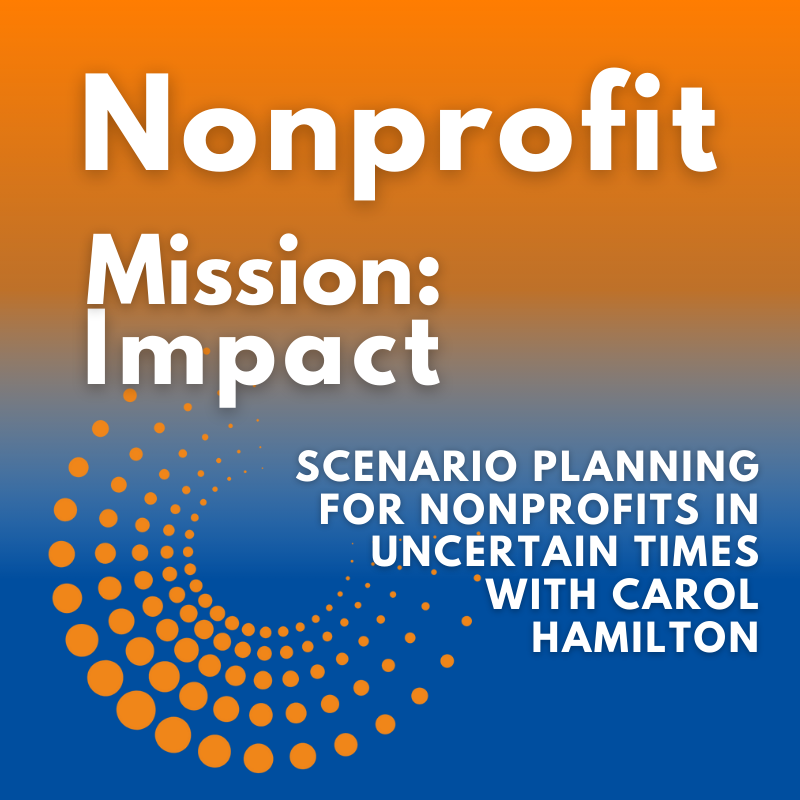
Scenario Planning for Nonprofits in Uncertain Times with Carol Hamilton
As nonprofit leaders move into 2026, uncertainty no longer feels episodic—it feels constant. Scenario planning offers nonprofit leaders a practical way to navigate uncertainty by shifting from reactive decision-making to clearer priorities, stronger alignment, and more confident, values-aligned choices—even when the future is unpredictable.
In this episode of Nonprofit Mission: Impact, host Carol Hamilton names the fatigue, overwhelm, and decision paralysis many leaders are carrying after this past year of heightened disruption. She introduces scenario planning as a practical, grounding strategy tool designed specifically for uncertain times. She discusses:
What scenario planning and is not
Why it is a tool that is particularly suited to the times we are in
How scenario planning helps nonprofit leaders regain a sense of agency, clarify what’s within their control, and align staff and board around thoughtful, values-aligned responses to multiple possible futures.
Through clear explanations and client examples, the episode shows how scenario planning can help leaders move from reacting and spinning to steering with intention.
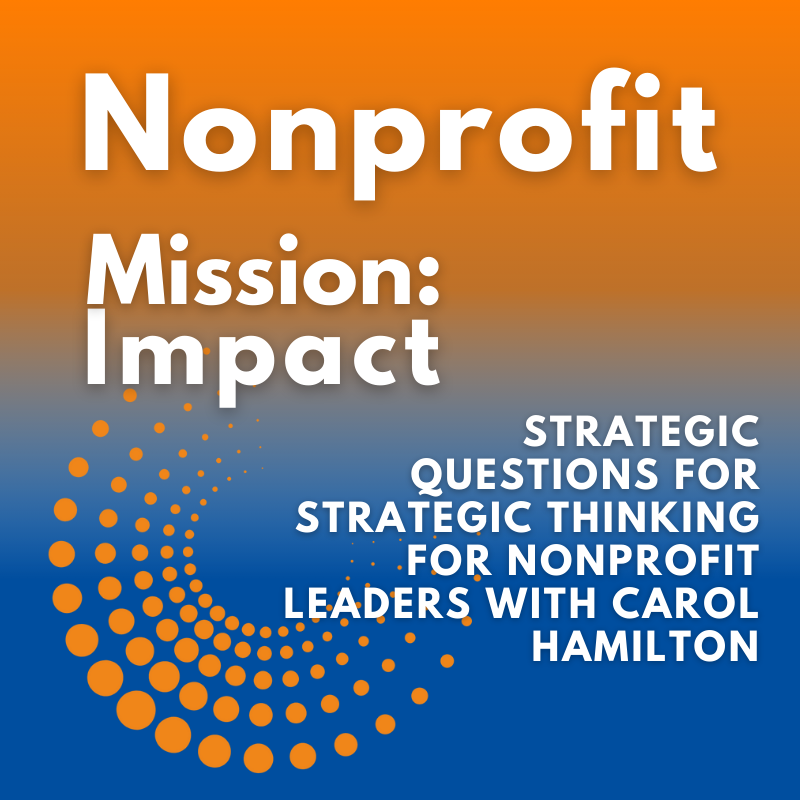
Strategic questions for strategic thinking for nonprofit leaders with Carol Hamilton
Strategy for nonprofits is not a plan to perfect but a human practice—built through care, curiosity, and intentional choices in the face of uncertainty.
As the year draws to a close, episode 138 of Nonprofit Mission: Impact brings together reflections from a wide range of nonprofit leaders and thinkers, all responding to one central question: What should nonprofit leaders ask themselves to be more strategic?
Across topics as varied as crisis management, equity, careers, evaluation, organizational design, culture, and innovation, a clear throughline emerges—strategy is deeply human work. Rather than offering abstract frameworks, the episode highlights:
practical, grounding questions and practices that help leaders navigate uncertainty with clarity, intention, and care.
An invitation to slow down, resist urgency, tend to themselves and their teams,
Why it's important to surface assumptions, seek multiple perspectives, and make decisions rooted in both alignment and capacity.
Together, these reflections offer a steadying guide for leaders facing complexity in the year ahead.

Navigating Through the In-Between with Interim Nonprofit Leadership with Erin Stratford Owens
How can nonprofit organizations navigate leadership transitions with steadiness and clarity? In episode 137 of Nonprofit Mission: Impact, Carol Hamilton talks with Erin Stratford Owens, a seasoned interim executive director to answer this question. Carol and Erin talk about:
what makes interim leadership distinct from simply “holding down the fort” — it’s a time for honest reflection, system assessment, and preparing the path for what’s next.
how boards and staff can make the most of an interim period,
the common mistakes to avoid, and why slowing down to plan for sustainability — rather than reacting in urgency — is essential for long-term impact.
The conversation offers nonprofit leaders a grounded perspective on turning moments of uncertainty into opportunities for renewal and learning.

Innovation Starts with Nonprofit and Association Culture with Elizabeth Engel and Jamie Notter
In episode 136 of Nonprofit Mission: Impact, Carol Hamilton, Elizabeth Engel, and Jamie Notter talk about their new white paper Lean at 10: Culture Eats Methodology for Lunch. Ten years after Engel first explored Lean Startup principles in the nonprofit and association world, she and Notter revisit what’s changed—and what hasn’t. Carol, Elizabeth and Jamie discuss:
Why the tools of innovation are accessible, yet the real challenge in adoption lies in organizational culture.
how competing commitments, fear of failure, and rigid silos can quietly sabotage innovation efforts
what leaders can do instead to nurture learning, empathy, and experimentation.
For nonprofit and association leaders navigating rapid change, this conversation offers a candid look at how to build cultures that support innovation—not resist it.

Designing nonprofits for impact with Julian Chender
In episode 135 of Nonprofit Mission: Impact, Carol Hamilton talks with organizational design consultant Julian Chender about how nonprofits can move beyond simple restructuring to intentional organizational design that aligns strategy, structure, and process.
They discuss:
how organizational design is not the same as restructuring
how design choices impact effectiveness, collaboration, and long-term sustainability.
the pitfalls of designing around personalities,
the importance of strategic clarity when facing downsizing or merger decisions.
The conversation offers nonprofit leaders practical insights into building organizations that are resilient, adaptable, and positioned for impact.

Rethinking Nonprofit Program Evaluation with Kayla Meyers
In episode 134 of Nonprofit Mission: Impact, host Carol Hamilton welcomes guest Kayla Meyers, founder of Bridgepoint Evaluation, for a conversation about reimagining program evaluation in nonprofits.
They discuss:
Why evaluation is not an audit or judgment as it has sometimes been in the past
It should be a collaborative, curiosity-driven process that opens communication, supports learning, and improves impact.
How to create right-sized, useful evaluation practices rooted in strategy and driven by purpose.
How evaluation can be a force for good—helping organizations tell fuller, more meaningful stories about their work and the communities they serve.

Creating Safer Nonprofit Spaces with Paula Brantner
In episode 133 of Nonprofit Mission: Impact, host Carol Hamilton and guest Paula Brantner, workplace fairness consultant and founder of Accountability Ignited, unpack the real challenges nonprofits face in preventing harassment, bullying, and misconduct.
They talk about:
The often-overlooked gaps in nonprofit systems—particularly around reporting mechanisms—and
The false sense of security many mission-driven organizations have about their immunity to these issues.
How to take a proactive, values-based approach rooted in trauma-informed practices,
Why codes of conduct need to include all constituents, including for example sponsors and vendors to be effective
For nonprofit and association leaders seeking to build safer and braver organizational cultures, this episode is full of actionable insight.
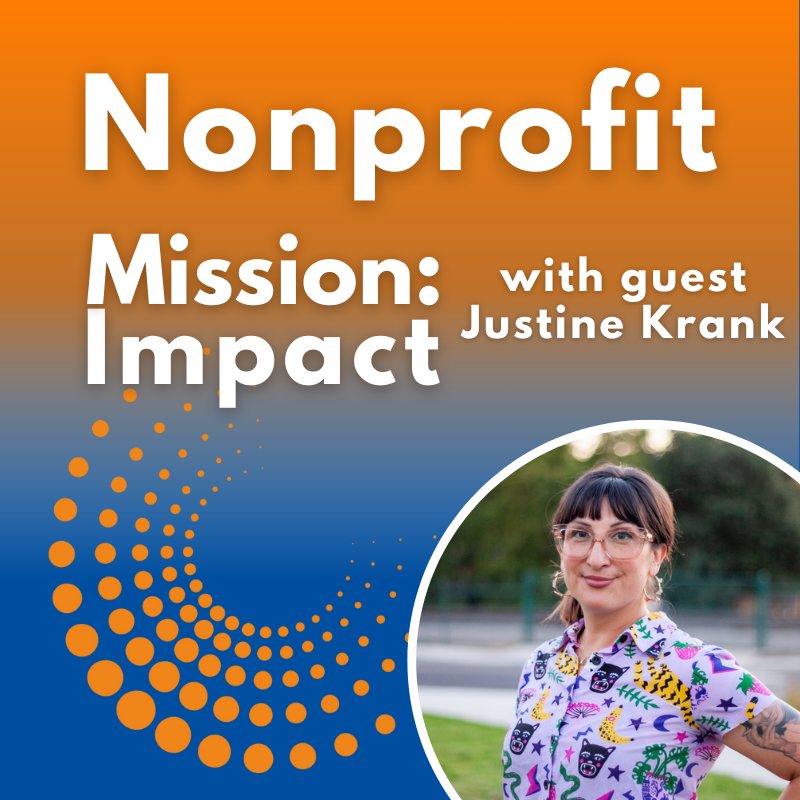
Demystifying Government Grants for nonprofit leaders with Justine Krank
In episode 132 of Nonprofit Mission: Impact, Carol Hamilton and Justine Krank discuss the realities and nuances of pursuing US government grants for nonprofit organizations.
They discuss:
common misconceptions including that government grants equals federal grants
The challenges and compliance demands that come with government dollars.
How to decode complex RFPs -- the hidden requirements that can make or break an application, and
how to get an organization truly grant-ready — not just on paper, but with the capacity to manage the work.
why the human side of building relationships even in the often opaque government grant space is important

When the Stakes Are High: Centering People in Tough Nonprofit Leadership Moments with Melissa Kessler
In episode 131 of Nonprofit Mission: Impact, Carol Hamilton and Melissa Kessler explore the intersection of communications and organization development, particularly in moments of crisis, transition and change. They talk about
how internal communications can either reinforce or undermine values, strategy, and humanity within an organization.
how to navigate layoffs, restructuring, or organizational shifts with humanity
why how we communicate is just as important as what we decide.
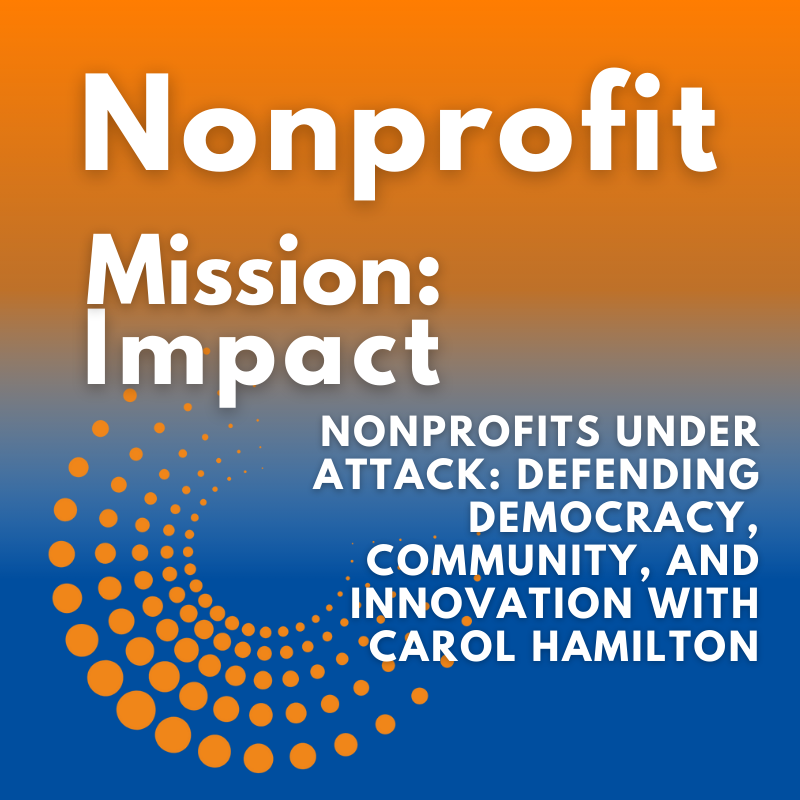
Nonprofits Under Attack: Defending Democracy, Community, and Innovation with Carol Hamilton
In episode 130 of Nonprofit Mission: Impact, Carol reflects on five years of podcasting and the sobering state of the nonprofit sector in 2025. While celebrating milestones, she also underscores the challenges nonprofits face amidst unprecedented political attacks, funding cuts, and threats to long-standing principles like nonpartisanship. Despite these challenges, Carol highlights the resilience, innovation, and critical role nonprofits play in society—from filling essential gaps to fueling social movements, strengthening democracy, and sparking innovation. She calls on nonprofit leaders to share their stories, advocate for the sector, and remind their communities why nonprofits matter now more than ever.

Tribute: Fundraising Without Fear: Building Relationships That Fuel Your Nonprofit Mission with Sabrina Walker-Hernandez
In this episode of Nonprofit Mission: Impact, Carol Hamilton gives a tribute to nonprofit consulting star and nonprofit governance and fundraising expert Sabrina Walker Hernandez, President & CEO of Building Better Boards, by re-releasing their conversation from 2021. Ms. Hernandez passed away in July 2025 after a long battle with cancer.
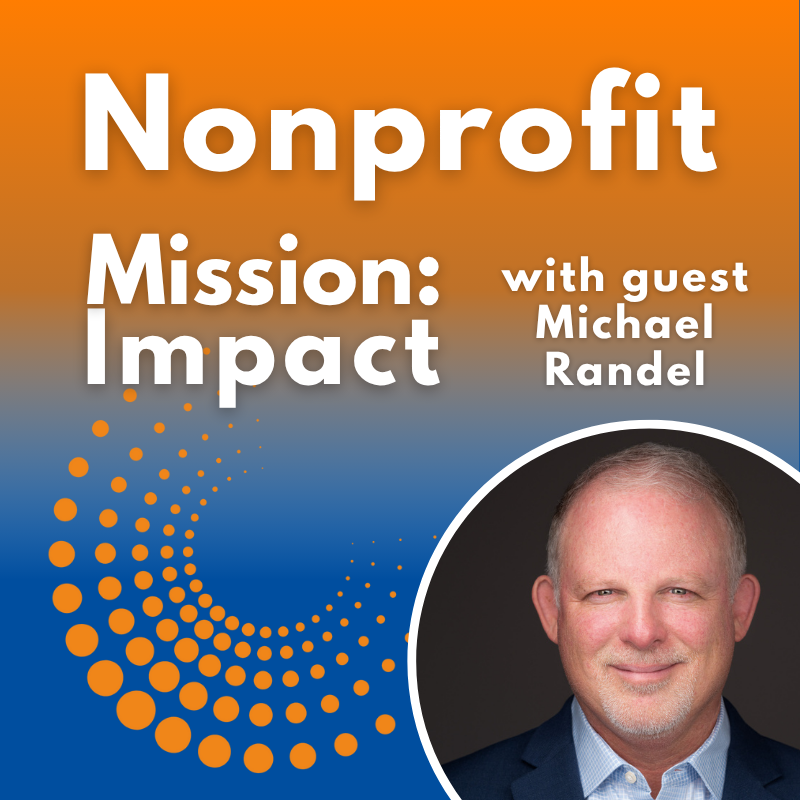
Building psychological safety in nonprofit organizations with Michael Randel
In episode 128 of Nonprofit Mission: Impact, Michael Randel joins Carol to explore how psychological safety—often dismissed as a “soft” concept—plays a critical role in nonprofit team performance, learning, and innovation.
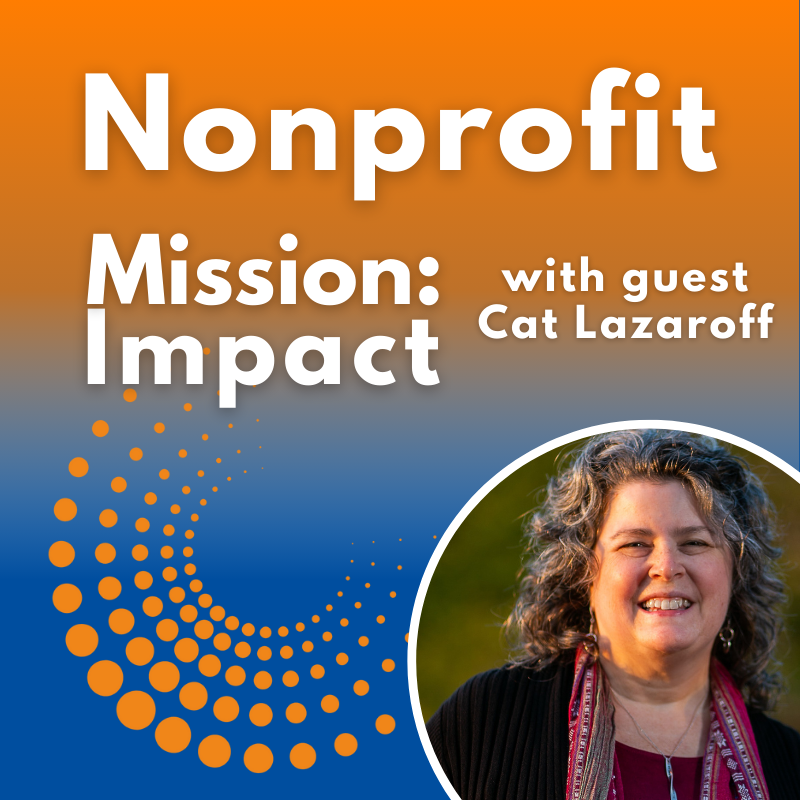
From Guilt to Responsibility: A white nonprofit leaders journey into equity work with Cat Lazaroff
In episode 127 of Mission: Impact, Carol Hamilton speaks with Cat Lazaroff. They talk about her work around engaging white-led and majority-white organizations in meaningful culture change to more inclusive, diverse and equitable cultures.
They explore:
how nonprofit leaders, especially white leaders, can begin and sustain their own equity learning journeys.
Privilege, identity, conflict, organizational culture, and the necessity of holding multiple truths.
how culture transformation isn’t about quick fixes, but rather long-term commitments, courageous relationships, and collective learning.

Navigating Nonprofit Careers with Matt Hugg
In episode 126 of Nonprofit Mission: Impact, Carol Hamilton and Matt Hugg discuss the unique landscape of nonprofit careers.
Together, they explore:
what makes nonprofit work meaningful and distinctive, including the opportunities and challenges for those transitioning into or advancing within the sector.
how nonprofit professionals can align their skills and passions,
how to navigate career shifts, and maintain their connection to mission-driven work.
This conversation offers nonprofit leaders practical wisdom on supporting their teams and nurturing their own professional journeys.

Beyond the Ask: Building nonprofit board champions with Michele Walls
In episode 125, of Nonprofit Mission: Impact, Carol Hamilton talks with Michele Walls. Michele shares her deep well of experience in nonprofit fundraising, communications, and strategic development. They explore:
the importance of thoughtful relationship-building, patience, and team collaboration in securing sustainable funding.
how fundraising is a team effort and a long game.
how to move from reactive panic to strategic action—even amid uncertainty and funding contractions.

Embodied leadership for nonprofits with LeeAnn Mallorie
In episode 124 of Nonprofit Mission: Impact, Carol Hamilton and LeeAnn Mallorie discuss navigating leadership from a place of embodiment, resilience, and grace. They explore:
how tuning into the body can help leaders make better choices, weather organizational turbulence, and come through crisis with renewed purpose.
How our effectiveness and influence are deeply tied to how we relate to ourselves—and that honoring our inner wisdom is not a luxury, but a necessity in today’s climate of uncertainty and change.

Using AI for better nonprofit fundraising with Josh Hirsch
In episode 123 of Nonprofit Mission: Impact, Carol Hamilton and Josh Hirsch discuss using AI in fundraising and donor engagement.
They explore:
The evolution of AI, and its potential to enhance how organizations connect with donors.
How to train AI tools effectively, leveraging data responsibly, and using AI to enhance—rather than replace—human-driven strategy.
Why nonprofit leaders who embrace AI thoughtfully do not need to fear the technology

Building community through nonprofits with James Young
In episode 122 of Mission: Impact, Carol Hamilton and James Young discuss the role of community, social innovation, and problem-solving in nonprofit leadership. They explore
how organizations can foster meaningful collaboration,
move beyond traditional silos, and embrace an interdisciplinary approach to tackling complex challenges.
the importance of balancing expertise with curiosity,
strengthening both bonding and bridging social capital, and designing intentional community experiences that drive impact.
Together, they reflect on how associations and nonprofits can evolve to meet the shifting needs of their members and society at large.

Ethical video storytelling for nonprofits with Rachel Jellinek
In episode 121 of Nonprofit Mission: Impact, Carol Hamilton and Rachel Jellinek discuss the power of video storytelling for nonprofits. They talk about:
how nonprofits can use video effectively to connect with their audiences,
How to maintain ethical storytelling practices.
the importance of focusing on strengths rather than deficits, ensuring those sharing their stories have agency, and balancing emotional impact with authenticity.
The conversation also explores common mistakes nonprofits make when creating videos and best practices for incorporating video storytelling into their communications strategy.

Innovation for nonprofits with Leah Kral
In episode 120 of Nonprofit Mission: Impact, Carol Hamilton and Leah Kral discuss how to foster innovation within nonprofits.



